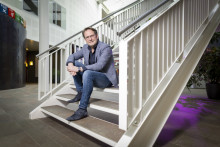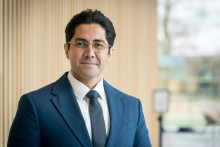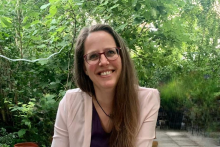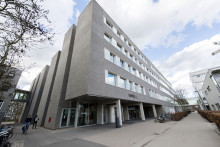Loohuis is a senior lecturer working in the Entrepreneurship & Technology Management department of the BMS faculty. Ask him about what he thinks constitutes good education and he will share his clear vision with you. Loohuis strives to sufficiently incorporate practical reality and he enjoys seeing business or institutions allowing students to run into everyday problems. This gives them the opportunity to explore the nature of the issue. It is certainly true that Loohuis grades his students in the traditional manner, but he would much rather hear what they actually learned. How they approached complex issues, found a solution and dealt with criticism.
 According to Loohuis, the difference between a good and an excellent teacher presents an interesting paradox. The power of letting go. Give students the chance to fail. Do not get involved immediately, even when you see someone heading down the wrong path. A teacher does not always have to be giving instructions. He sees it as a challenge for any lecturer to let go of that tendency. Switching up your repertoire.
According to Loohuis, the difference between a good and an excellent teacher presents an interesting paradox. The power of letting go. Give students the chance to fail. Do not get involved immediately, even when you see someone heading down the wrong path. A teacher does not always have to be giving instructions. He sees it as a challenge for any lecturer to let go of that tendency. Switching up your repertoire.
As a teacher, Loohuis like to bring up points of attention. For example, he cherishes the close relationships that the university maintains with the region, but also believes there is still a lot more to be gained from those connections. He thinks education can play a much bigger role as a driving force in the region, from which new opportunities for research and collaboration will arise. His efforts have earned him the BMS Faculty’s External Affairs Award, presented by Theo Toonen (Dean BMS). He describes receiving that award as an honour.
Theory and practice do not represent two separate worlds. Nowhere is that more clear than in the field of education.
Propositions
Although Loohuis appreciates it when lecturers strive to incorporate the field of practice into their education as much as possible, he cannot separate that practice from a solid theoretical foundation. After all, all theory was practice at some point. In his eyes, theory and practice do not represent two separate worlds. Nowhere is that more clear than in the field of education. If we go through life without theory, we would have to reinvent everything all over again every single day because we would be living with propositions. How do you approach someone without theory? He believes trust - a theoretical construct - plays a huge role in this.
Loohuis’s passion stems from the fact that students will have to conquer themselves during their dynamic learning process. Learning from each other and taking responsibility for the process and the result. That is the freedom and responsibility you want students to have. Ask the students questions instead of the other way around. Let students look for examples to get to the bottom of a problem. It is at those times - when theory and practice come together - that Loohuis loves his job the most. He believes those are the times when students’ eyes are opened, allowing them to see things in a new light and change matters in that context with the help of theory.
Variety
However, Loohuis has no doubt that the lecturer's role is changing - although ‘change’ may not be the right word. Instead, he refers to a variety of roles. One moment, a lecturer's role is that of a partner. The next moment, they are more of an authority. That more traditional role should not be pushed aside. Loohuis believes that if that conviction - a lecturer being able to play multiple roles - is held at every layer of the university, it creates a solid foundation for top-quality university education.
Change is not always a good thing, especially when it happens too often and even more so when changes are made for their own sake.
The innovation of education and the role that the teacher plays in this process is therefore a development that fascinates Loohuis. To him, innovation does not necessarily mean something is not going well. Instead, it is more about the question of what type of students a university wants to produce. He believes that question should always be asked first before you begin the process of innovation. After all, change is not always a good thing, especially when it happens too often and even more so when changes are made for their own sake. If they are being flooded with new terminologies pertaining to innovations, chances are that lecturers will jump ship. That is the message he wants to impart on the UT's change strategists, especially when it comes to a comprehensive development such as Shaping 2030, the UT's vision and strategy.






